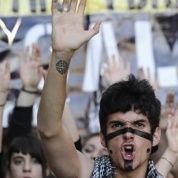On May 15, 2011, Madrid's Puerta del Sol became the stage on which the Spanish people began airing their frustrations. The country was in the second year of a harsh economic crisis, and the establishment Socialist party (PSOE) had instituted a series of harsh austerity measures intended to prevent a Spanish bailout.

At the time, Spaniards saw the measures were not working. Unemployment had reached 21 percent, the highest in the Eurozone, and youth unemployment was at 40 percent. A grassroots conglomeration of bloggers and activists released a manifesto titled "Real Democracy NOW."
OPINION:
The Sanders Campaign and the Revival of Socialism in the US
It read: "Some of us are more progressive, others more conservative... But we are all worried and 'indignant' about the political, economic and social situation."
And so Los Indignados were born, with people from across Spanish society taking over Madrid's center, setting up camps and organizating actions and debates about civil, economic and political issues ranging from women's rights to the end of capitalism.
That year alone there were 21,000 protests across Spain against measures that a large portion of the population deemed restrictive and undemocratic. The economic crisis worsened, an the establishment socialists were voted out of office in November 2011. The right-wing Popular Party (PP) won a supermajority and instituted a string of harsh, neo-liberal measures.
Pensions were cut, banks were given free reign to charge what they needed to keep themselves solvent, unions and workers' protections were attacked, and public services had their budgets reduced.
RELATED:
Podemos Walks Away from 'Incompatible' Deal with Socialists
As a result, poverty and unemployment increased, as did evictions due to untenable mortgages that Spaniards had taken when the economy was booming. Between 2007 and 2014, an estimated 600,000 people were kicked out of their homes.
Many committed suicide. Driven by the injustice they witnessed, a group of activists and humanitarians formed the Platform for Mortgage Victims (PAH, by its Spanish acronym). The group would demonstrate outside properties set to be repossessed by banks, blocking authorities from taking the home or business.
The Indignados movement threw its weight behind them, and the two managed to bring the issue of mortgage protection into the political arena.
This was the movement's first serious foray into politics, and a bipartisan freeze on mortgage evictions in 2012, motivated by the catastrophe of suicides and resulting pressure from PAH, showed members that their voices had power.
Los Indignados were the first major expression of anti-austerity and anti-capitalism in the West. They predate the Occupy Wall Street movement in the U.S. and Syriza in Greece, and sectors of the movement managed to establish themselves politically, owing to political action on repossessions and other issues.
Then in 2014, the Left-wing Podemos party was formed. Podemos tapped into the continued discontent of the Spanish populace. Its leader, Pablo Iglesias, a 30-something professor, said the party is a continuation of the Indignados movement.
Less than two years after its establishment, Podemos won 20 percent of the popular vote in the December 2015 election, as compared to PP's 28.7 percent and PSOE's 22 percent, blocking either of the mainstream parties from gaining a majority.
Podemos initiated talks with PSOE and a coalition of Leftist parties named United Left (IU, per its Spanish acronym), but no agreements to form a government were made. For the first time sense the country transitioned to democracy after the death of fascist dictator Francisco Franco in 1975, a run-off election is required, and Podemos, who were able to create an election pact with IU, are just as likely to win enough seats to form a government as either PP or PSOE.
The effect of the Indignados movement is not only felt in its native Spain, but across the planet. Similar movements have won elections in Greece, and insurgent candidates such as Vermont Senator Bernie Sanders in the U.S. and Labour Party leader Jeremy Corbyn have mounted successful campaigns that have swung the political discourse of those nations to the Left.
As the Sanders campaign, which many see as an extension of the Occupy Wall Street Movement, begins winding down, the question on the minds of many U.S. citizens is whether or not his followers will be able to transition from campaigning for Sanders to campaigning for a movement.
RELATED:
French Protests over Labor Reform Culminate in Violent May Day
Both sides of the U.S.' political spectrum have had insurgent candidates make waves this year, with Donald Trump even becoming the presumptive Republican nominee. Analysts have said that their success comes from the fact that many middle class workers are unhappy with their quality of life.
It increasingly appears that former Secretary of State Hillary Clinton, the only establishment candidate left in the race, will win the Democratic party's nomination and then the presidency. If so, Wall Street and major corporations will continue making record profits at the cost of the middle class.
With conditions like these, it is to be expected that societal frustrations make themselves seen through political means. Sanders' supporters, and Sanders himself, will not run out of fuel for their cause, and their message will continue to resonate.
Sanders' supporters can capitalize on this, if they remain united, both with themselves and the burgeoning international Left.
The lasting effect of Los Indignados, five years after the protests in Madrid, is that the global Left has once again been given a voice in mainstream political dialogue.
WATCH: Fragmented Spain